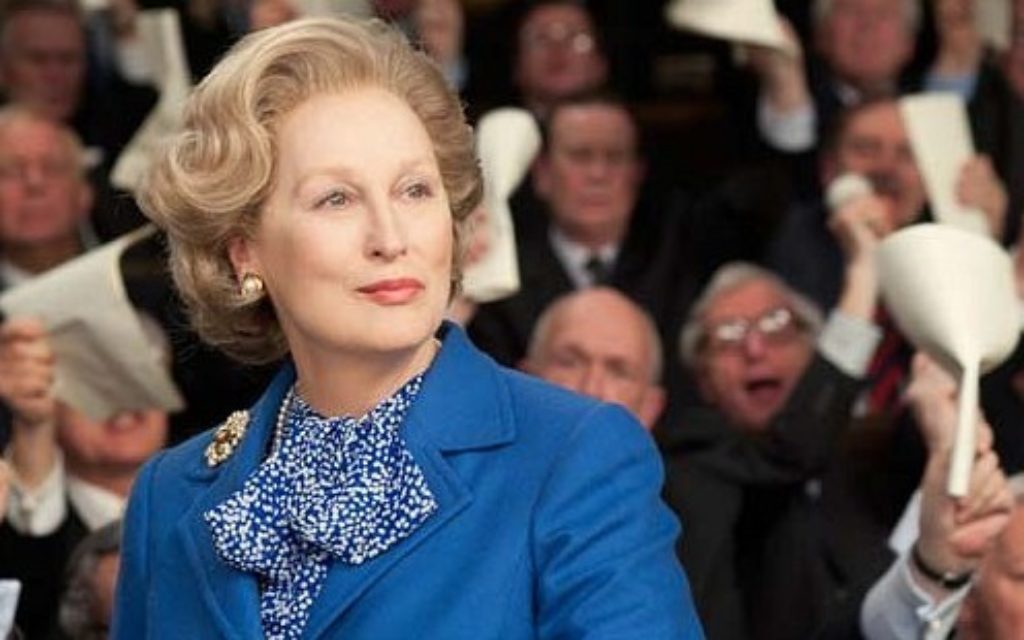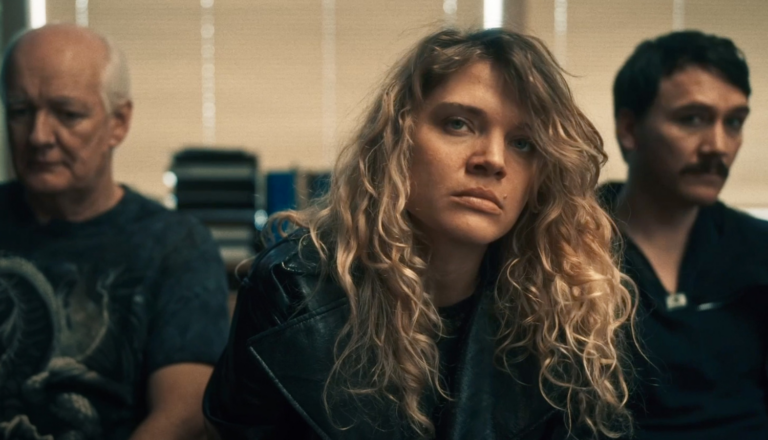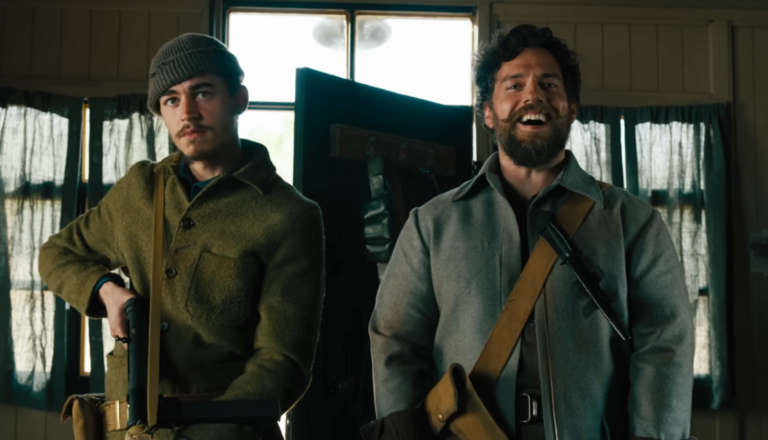Notice: All forms on this website are temporarily down for maintenance. You will not be able to complete a form to request information or a resource. We apologize for any inconvenience and will reactivate the forms as soon as possible.
Content Caution

Credits
In Theaters
- December 30, 2011
Cast
- Meryl Streep as Margaret Thatcher; Jim Broadbent as Denis Thatcher; Alexandra Roach as Young Margaret Thatcher; Harry Lloyd as Young Denis Thatcher; Olivia Colman as Carol Thatcher; Anthony Head as Geoffrey Howe; Nicholas Farrell as Airey Neave
Home Release Date
- April 10, 2012
Director
- Phyllida Lloyd
Distributor
- The Weinstein Company
Reviewer
Movie Review
The Soviet Union gave Margaret Thatcher her colorful nickname “almost lovingly,” we hear in The Iron Lady. And, as anyone who knew the woman—or even knew of her—it was apt.
The daughter of a small-town grocer, Margaret, through strength of intellect and force of will, pushed her way into the male-dominated halls of the British parliament. When her party favored conciliation, Thatcher advocated confrontation. When her adversaries thought her weak, she showed she could fight with the best of ’em.
Through recession and war and 11 rough-and-tumble years, Thatcher dominated U.K. politics—a leader both loved and loathed, a prime minister admired and reviled. While many regard her as one of the island kingdom’s greatest leaders, people also called her merciless when she sliced budgets, a warmonger when she fought Argentina for possession of the Falkland Islands. In the end her own conservative party deposed her for being too rigid, too hard, too—
“Obstinate,” she says.
It’s 2008, and Margaret Thatcher—18 years removed from office—is helping husband Denis complete a crossword puzzle. She’s not speaking of herself in that moment, but she might as well be. She’s older now, and softer it would seem. She tut-tuts over the price of milk, fusses at Denis for not wearing a scarf. And yet the iron has not yet begun to bend … even as the rest of her faculties begin to fade.
Denis, you see, is dead—gone for years. And yet Margaret still sees him, hears him, converses with him over soft-boiled eggs.
She knows she’s living a fantasy. Or, at least, most of the time she knows. And in moments of clarity, she knows she needs to dispel him for her own good.
“I can manage perfectly well without you now,” she tells him.
But is it possible the Iron Lady has finally, after all these years, met her match? Can she, with sheer force of will, push away the scourge of dementia?
Positive Elements
Prodded by her daughter, Margaret visits a doctor who begins asking questions related to her state of mind. Is she sleeping well? Is she having hallucinations? How is she feeling?
Margaret pounces on the doctor’s use of the word feel. “People don’t think anymore,” she says. “They feel.” Margaret is far more interested in the realm of thoughts and ideas than mere feelings. So the doctor rephrases his question: What are you thinking? he asks.
“Watch your thoughts for they become words,” she says. “Watch your words for they become actions. Watch your actions for they become habits. Watch your habits, for they become your character. And watch your character, for it becomes your destiny. What we think we become. My father always said that … and I think I am fine.”
Politics aside, the Margaret Thatcher we see on display in The Iron Lady is strong, principled and in many ways admirable. She is not without her flaws: She can come across as a bully—someone who might do well to pay more attention to how other people feel. Her drive to power did not come without sacrifice. And yet we see a hero, too—one who stands on her principles and articulates them beautifully. With every turn and every step, she walked into the political breech unblinking, and many a quote that comes from her mouth here might wind up on someone’s refrigerator.
And despite Margaret’s disdain for feelings, we also see a subtle, measured affection emanating from her to Denis: a meaningful glance, a squeeze of the hand, a playful game with a toy mouse. Their relationship is not, perhaps, ideal. But they stand by each other through the best and worst of times. Margaret’s dedication to the country is equaled only by Denis’ dedication to his driven, difficult spouse. And while Margaret is not the best mother, either, she does love her children. When an image consultant tells her what she’ll need to get rid of in order to push for party leadership, she agrees to everything … except her dual strand of pearls. Those, she says, were a gift from her husband on the birth of her twins, and “they are absolutely nonnegotiable.”
Through this and other hints, the movie subtly confronts us with the idea that sometimes service to one’s family can be just as meaningful and just as world-changing as storming the gates of power. Margaret makes some pretty difficult—questionable—choices to further her political career: When she wins a seat in parliament, the film shows her driving away, her children running after her and calling desperately for her to come back. Later, she gives her daughter a driving lesson: “One must be brave if one is to take the wheel,” she says. Her daughter, Carol, thinks they’re sharing a moment—but in reality Margaret’s plotting a move for party leadership. When the two get home and Carol realizes the truth, she storms off.
Those things are not positive, of course, but they’re useful for more than just the creation of tension. They’re used to teach us about life. Denis calls Margaret on her ambition—saying she’ll stop at nothing on her drive to the top. “The rest of us—me, the children—we can all go to h‑‑‑!” he shouts.
When she watches old videos of their family—videos shot before her career took off—Denis appears behind her and says, “You can rewind it, but you can’t change it.”
Spiritual Elements
Upon taking office, Margaret paraphrases a prayer from Saint Francis of Assisi: “Where there is discord, may we bring harmony; where there is error, may we bring truth; where there is doubt, may we bring faith; and where there is despair, may we bring hope.”
In her mind, Margaret sees Denis journey from ghost-in-this-life to the final afterlife, exiting through a doorway of light.
Sexual Content
We briefly see frontal footage of two bare-breasted women celebrating Great Britain’s victory in the Falkland Islands. That same historical video includes a high-wattage kiss shared by another couple. Margaret reveals cleavage as her formal dress is being adjusted and worked on by an attendant.
Violent Content
Violence was not uncommon during Margaret Thatcher’s reign. When an announcer intones that the Irish Republican Army bombed Hyde Park, we see footage of horses killed in the attack (their entrails on the ground). When they talk about economically spurred riots, we see protesters being mowed down by horses or beaten by officers. Clips of the Falklands war highlight missile launches and explosions. Military men bleed on the decks of ships.
A massive explosion rips through the Thatchers’ hotel room in Brighton, almost completely obliterating their bathroom, where Denis is brushing his teeth. He escapes unscathed, but not everyone did. We know that the real-life bomb killed five people. Protesters surround the prime minister’s car, hitting it and hurling insults at Margaret. As a girl, Margaret dashes from a bomb shelter to cover a plate of butter during World War II—explosions flashing and booming all around.
Crude or Profane Language
Characters say “h‑‑‑” three times, “d‑‑n” twice, and “b‑‑tard” and “b-gger” once each. “Bloody” is exclaimed a half-dozen times. God’s name is misused four times.
Drug and Alcohol Content
Several people, including Denis, smoke cigars and cigarettes. Margaret shows a fondness for alcohol. When someone offers to pour her some wine with dinner, she waves the bottle away and instead asks for whiskey. She quickly pours herself a drink when her grown daughter stops by for a visit. She mixes drinks with the spirit of her dead husband, who chastises her for drinking too much. When both of them are younger, Denis pours liquid from a flask into Margaret’s teacup.
Conclusion
When Denis asks Margaret to marry him, she says yes—under one condition: She will not be someone who will stand in the background; she’ll not die washing teacups. “One’s life must matter, Denis,” she tells him. “Beyond all the cooking and the cleaning and the children, one’s life must mean something!”
Margaret was at the threshold of her incredible career—a political arc that would see her change the face of Great Britain and mightily influence the world. Indeed, her life would mean something.
And yet, it would’ve meant something too had she turned her back on politics—opted to devote herself as a wife and mother. Her life would’ve meant something to the people most important to her.
In The Iron Lady, we see the cost of Margaret’s devotion to her country. She tears down her share of barriers. But in so doing, she builds others between herself and her family. By 2008, we see a woman largely alone: Her son’s in South Africa; her daughter doesn’t quite know how to relate to her. Her only confidante is her husband. Her dead husband.
The Iron Lady has earned her nickname. Strong. Unyielding. Hard. Cold. And by the time the credits roll—even as the film lauds her courage and principles and achievements—it whispers, was it worth it?
When Denis’ spirit prepares to leave, Margaret begs him to stay. I’m not ready, she pleads as he walks down the hallway. “I don’t want you to go!”
“You’re going to be fine on your own, love,” Denis tells her. “You always have been.”
It’s a complicated statement. Is it true? Absolutely. We’ve seen her go her own way from the beginning of her career—a grocer’s daughter making an impact in a world dominated by men. Is it laudatory? Absolutely. Who could deny the strength of will and character it took for her to do what she did?
And yet there’s a rebuke in there, too. You always have been.
And with that, Denis is gone. Margaret is alone, truly alone. She speaks more softly, it would seem, more gently. She asks Carol to help her with her hair, an uncommonly intimate gesture in their family. And we see her washing a teacup.
We’re left to wonder, doesn’t a life spent washing teacups mean something, too? Isn’t it also beautiful? Isn’t it also bold?


Paul Asay
Paul Asay has been part of the Plugged In staff since 2007, watching and reviewing roughly 15 quintillion movies and television shows. He’s written for a number of other publications, too, including Time, The Washington Post and Christianity Today. The author of several books, Paul loves to find spirituality in unexpected places, including popular entertainment, and he loves all things superhero. His vices include James Bond films, Mountain Dew and terrible B-grade movies. He’s married, has two children and a neurotic dog, runs marathons on occasion and hopes to someday own his own tuxedo. Feel free to follow him on Twitter @AsayPaul.








